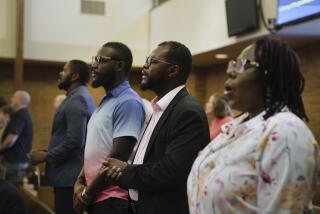U.S. Chicken Giveaway Doesn’t Fly in Fallouja
FALLOUJA, Iraq — Sgt. Jason McGinn’s Humvee convoy pulled up in front of the Saud ibn abi Wakas mosque with a load of frozen chickens Monday.
The chickens, rapidly defrosting in the midday sun, were meant for the needy families of Fallouja. McGinn’s psychological operations unit was making the delivery as part of its efforts to win over clerics and civilians alike in this city west of Baghdad that has been a center of Sunni Muslim resistance to the U.S. military occupation.
The imam, a slender, bearded young man, stared hard at McGinn and shook his head indignantly.
“We would rather eat rocks than eat chickens from Americans,” he spat out. “Even the poorest person in Fallouja doesn’t want chickens from you.”
McGinn’s unit was brusquely turned away at three of the four mosques it visited. The brushoff was yet another reminder for U.S. soldiers that hostility to the occupation runs deep in many quarters, and that it will take a lot more than frozen chickens to pacify Iraq.
“Hey, it’s a slow process, winning the hearts and minds of the people,” McGinn said after driving with the spurned chickens through a hail of rocks and bricks thrown by neighborhood children. “But we’re getting there, slowly but surely.”
The 2nd Brigade of the 3rd Infantry Division, which is charged with controlling Fallouja, has been at it for six weeks. Soldiers have distributed 37,000 gallons of free gasoline and 10,000 military meals. They’re repairing power and water lines and building a park.
Since the brigade arrived here June 4, armed attacks in Fallouja have been dropping steadily.
Fifteen such incidents were reported the first week, and seven in the fourth week, according to brigade figures. Last week, no such incidents were reported, the brigade said.
But Fallouja, which emerged as a center of resistance after U.S. forces killed more than a dozen Iraqis in an April confrontation there, remains emblematic of the stubborn resistance to the occupation. On June 30, a mysterious explosion rocked the Al Hassan ibn Ali mosque, and last week, Iraqi police demonstrated against the continued presence of U.S. soldiers at their compound downtown because the police were concerned about being so close to troops who have been attacked so frequently.
Just to distribute the 2,000 chickens Monday, the brigade sent four Bradley fighting vehicles and nearly a dozen Humvees mounted with machine guns. Soldiers armed with automatic rifles struggled to keep crowds of aggressively curious men and boys from swarming the distribution point.
Mohammed Hamad Fayath, a Fallouja resident who served as an interpreter for McGinn’s unit, said some imams were riled by the sudden arrival of heavily armed soldiers -- and did not want to be seen by their followers as cooperating with occupiers.
“Imagine if armed Muslim soldiers went to churches in America to give away chickens,” Fayath said. “Would they be welcomed?”
The chicken distribution had been arranged through the city’s mayor and chief imam, U.S. commanders said.
The local leaders -- not the Americans -- were supposed to have contacted 20 local mosques and come up with names of needy families, but the imams complained that no one had told them that armed American soldiers would turn up at their doors.
The reception was cordial at most of the mosques, said Lt. Robert Woodruff, who directed the distribution of chickens and canned meat. But McGinn’s unit faced a more chilly welcome: Two gunshots rang out as the Americans approached one mosque.
At another, imam Salahideen Khalid Obeid refused to speak to or look at McGinn. Obeid told McGinn’s translator, Fayath, that Americans were not welcome.
McGinn thanked the imam and offered a handshake. Obeid shook his head and coldly folded his arms across his chest.
At a nearby mosque, imam Jasem Abd Alwan was only slightly more conciliatory. After refusing the chickens, he offered an explanation of sorts.
“I can’t satisfy everybody here,” he told McGinn through the interpreter. “If I take something from you and there is a problem, I get the blame.”
Lt. Col. Eric Wesley, executive officer of the 2nd Brigade, called the hostile reception an aberration. He said most recipients of U.S. humanitarian assistance in Fallouja accept it graciously. He meets regularly with the town’s mayor, police chief and leading imam, Wesley said, and relations are improving.
Woodruff called the chicken operation “90% successful,” although he added, “Winning the trust of these people is a long, slow process.”
In frustration, McGinn considered using his unit’s Humvee-mounted loudspeakers to invite the town’s residents to come collect the chickens that had been refused by the mosques.
But his interpreter, Fayath, talked him out of it, saying it would attract a huge, unmanageable crowd.
McGinn agreed to allow Fayath to take the Iraqi driver of the refrigerated truck that had originally carried the chickens and deliver the remaining food to the mosques that had turned the Americans down.
“They won’t take it directly from you,” Fayath told the sergeant. “But they will take it from me.”
McGinn said he was not discouraged by the experience.
“As long as the food gets to the people who need it,” he said, “that’s what counts.”
More to Read
Sign up for Essential California
The most important California stories and recommendations in your inbox every morning.
You may occasionally receive promotional content from the Los Angeles Times.











